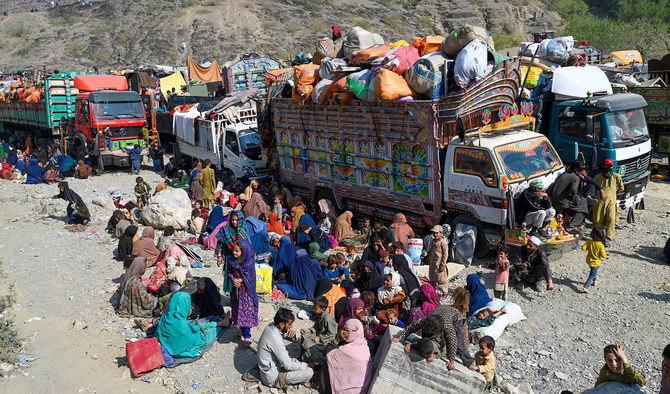Pakistan’s recent announcement of its intention to repatriate 1.7 million Afghan refugees has sparked a global debate that goes beyond its sovereign right to determine who resides within its borders. While Pakistan undoubtedly faces substantial challenges with the presence of this significant refugee population, the implications of this decision on the already strained humanitarian situation in Afghanistan cannot be ignored. It appears that Pakistan’s choice is not solely motivated by managing its domestic concerns, but is significantly influenced by its deteriorating relations with the Taliban government in Afghanistan.
Pakistan has, for decades, played host to Afghan refugees who have fled the violence and instability in their homeland. The generosity of Pakistan in providing shelter to millions of displaced Afghans has been commendable, earning international praise. However, Islamabad’s decision last month to repatriate Afghan refugees has raised important questions about its humanitarian obligations and caused considerable concern among humanitarian organizations.
On the one hand, Pakistan undoubtedly has the right to determine who resides within its territory, particularly considering the heavy strain the refugee presence places on the country’s already limited resources, including infrastructure, education, healthcare and employment opportunities. However, the timing and motivations behind this decision raise valid concerns.
Pakistan’s relationship with the Taliban government in Afghanistan has been fraught with complexities. While Pakistan was one of the few countries to recognize the Taliban regime during its previous rule, it has had to navigate a delicate diplomatic dance with the new Taliban leadership. The decision to send Afghan refugees back coincides with a period of deteriorating relations between Islamabad and the Afghan government.
The Afghan Taliban, which currently controls a significant portion of Afghanistan, may interpret this move as a sign of tacit support from Pakistan, signaling a departure from its long-standing policy of sheltering Afghan refugees. Pakistan’s decision could be seen as an attempt to appease the Taliban government, demonstrating a willingness to align more closely with its interests. However, the international community has expressed grave concerns about the Taliban’s human rights record, particularly regarding women’s rights and freedom of expression. Pakistan’s decision to return refugees under these circumstances has raised suspicions that it may be indirectly endorsing the Taliban’s rule.
The return of such a massive number of refugees to a country still grappling with the effects of decades of conflict and instability poses a significant humanitarian challenge. Afghanistan’s ability to absorb these refugees, provide them with shelter and meet their basic needs is severely limited. Humanitarian organizations have warned of a looming crisis as the refugees return to an environment with scarce resources and fragile infrastructure.
Moreover, many of these refugees have spent their entire lives in Pakistan and, for many of them, Afghanistan is an unfamiliar and unwelcoming place. The sudden displacement and return to their homeland are likely to have profound psychological and social effects on the refugees. Their resettlement and reintegration into Afghan society will undoubtedly be fraught with difficulties.
While Pakistan’s decision may be influenced by its relations with the Taliban government, it is important to note that this is not solely a humanitarian or moral dilemma, but a matter of geopolitical necessity. Pakistan has borne the brunt of the Afghan conflict, with increased violence, the influx of refugees and the drug trade destabilizing its western regions. By aligning its stance more closely with the Taliban government, Pakistan may hope to mitigate some of these security challenges.
Meanwhile, the UN and humanitarian organizations have expressed worries about the ability of Afghanistan to absorb such a massive influx of returnees. There are concerns that this action could lead to a worsening humanitarian crisis in Afghanistan, further exacerbating the hardships faced by its people.
International pressure on Pakistan to ensure that the repatriation process is conducted safely and in a manner respecting the rights of the refugees is likely to persist. The UN and other international actors are monitoring the situation closely to help mitigate the potential humanitarian challenges arising from this decision.
The international community must hold Pakistan accountable for the welfare and safety of the returning Afghan refugees. International aid and assistance must also be provided to Afghanistan to support the reintegration and rehabilitation of the refugees. Furthermore, Pakistan should work closely with international organizations to ensure that the repatriation process is conducted in a safe, dignified and voluntary manner, respecting the rights of the refugees.
Pakistan’s decision to return 1.7 million Afghan refugees to their homeland is a complex one with far-reaching implications. While Pakistan certainly has the right to determine who resides within its borders, the timing and motivations behind this decision have raised concerns. It is essential for Pakistan to balance its own interests with its humanitarian obligations, ensuring that the well-being of the refugees is not compromised. Moreover, the international community must remain engaged in addressing the worsening humanitarian situation in Afghanistan and supporting the Afghan people as they navigate the challenges of the post-conflict era.

